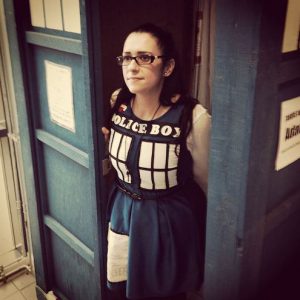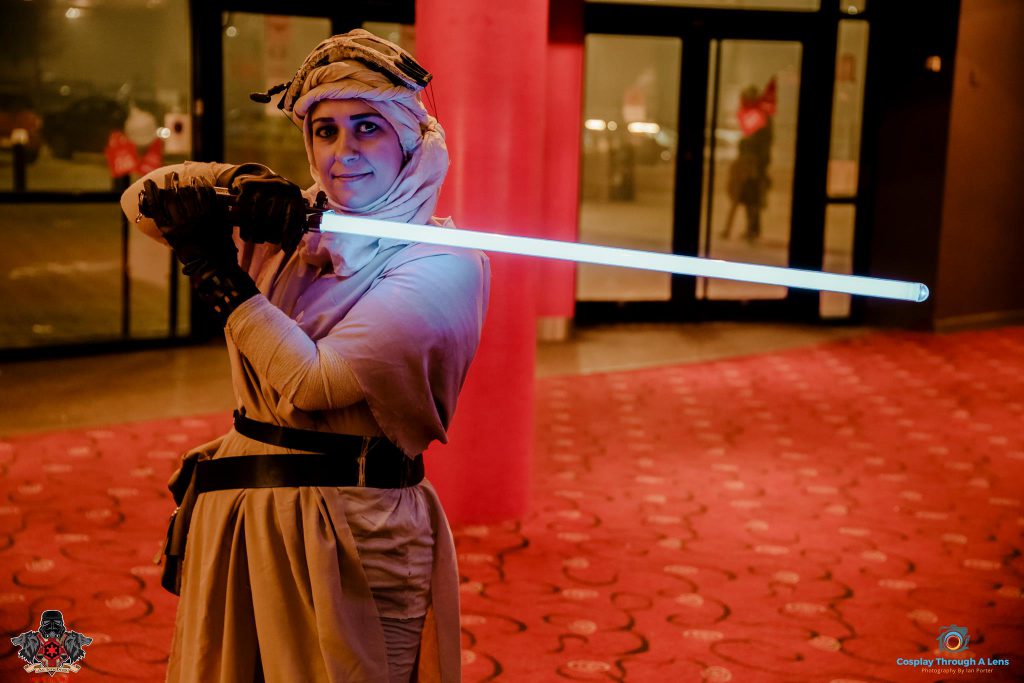
Nicky ‘trooping’ as Rey from Star Wars
My first memory of how some people treat girls differently to boys was when I was around four years old. I had an older male cousin who passed down toys he had outgrown, and I took a particular liking to his old skateboard.
I remember playing with it in the street and trying to push myself along. Eventually I could skate without falling off and had nearly mastered the kickflip. As I was practicing one day, a lady walked up to me, patted me on the head and told me to run off and play with some dolls, as skateboarding was for boys.
Fast forward a couple of decades later and here I am working in computer science – an industry which has a female workforce of around 6%. There has been a lot of talk about the need for a more diverse staff, and attracting more women to the industry, but it’s still not happening.
So why was it different for me? It wasn’t one but several things that made me feel like I could be a computer engineer.
I went to a local single sex school until I was 18 years old, where maths, physics, chemistry were all subject for girls.

Trooping as the Tardis police box
I had – and still have – fantastic role models. My mother used to be a police officer and from her, I learned to stand up for myself, speak my mind and not worry about what other people think of me. My father left school at 15 and worked his way up, starting as a delivery boy for the local public works department and retiring as head of the dispensary for the national health service in Gibraltar. He taught me that if there was something I really wanted, I should work hard and not give up.
Even though neither of my parents had gone to university (my dad doesn’t even have any GCSEs) they have both been very supportive of my education. In school we were allowed to use our classroom’s single computer if we finished our work early, which I often did. I must have shown some enthusiasm for it because the year I turned 10, I received a Spectrum 48k computer for Christmas. I worked my way through the manual that came with it, and became so enamoured with the fact I could type instructions into the computer and make it do things, that once I started I never really stopped.
Positive role models are vital if we are going to remove long-ingrained stereotypes. That’s why I visit schools and colleges to engage both girls and boys in fun and interesting STEM activities which prove they can be computer scientists and engineers. I pay particular attention to ensuring that girls and boys all do the same thing, and see themselves achieving something. I find it particularly beneficial when I reward them for a job well done, as it demonstrates and reinforces to them that they are capable.
I also give public lectures around topics of computer science, and liaise with the media on matters pertaining to science, so that female scientists are more visible to the general public. The University of Central Lancashire where I work is very encouraging of my STEM activities and allow me the time and resources to carry them out, even funding travel and equipment, and recognising me as a STEM engagement catalyst member of staff.
My favourite way to engage with young people is ‘trooping’, where I dress up as a recognisable character. Currently I troop as ‘Rey’ from Star Wars, along with R2-D2, to discuss robots and lightsabre technology, and how they can build one of their own if they learn more about science and programming.
Besides highlighting positive role models, we must teach scientific concepts in school that girls can relate to. We also need to work with parents to encourage children to study the right subjects for them, regardless of their gender.
Promoting success stories from university and the workplace is the start, but cracking the gender code requires us to do more to celebrate these women and demonstrate to younger girls that this is something they can do. At the same time we need to reach out to boys so they grow up with the mind-set that their sisters, girlfriends, wives and mothers are all just as capable of being scientists as they are.
We are publishing this blog to mark International Women’s Day on Thursday 8 March. The theme for 2018 is #pressforprogress




